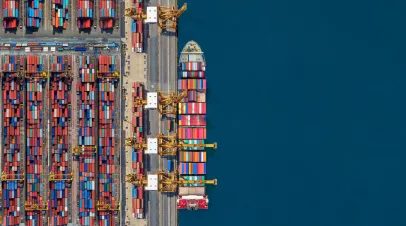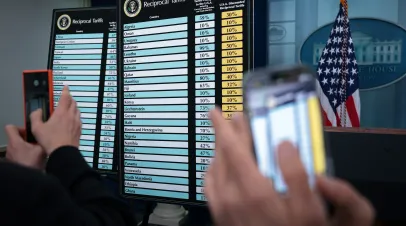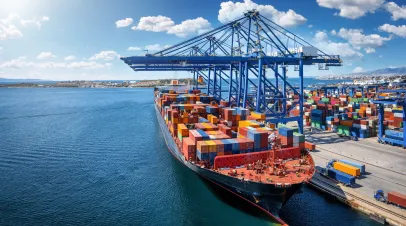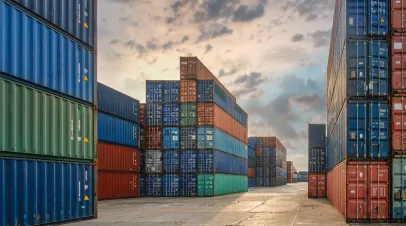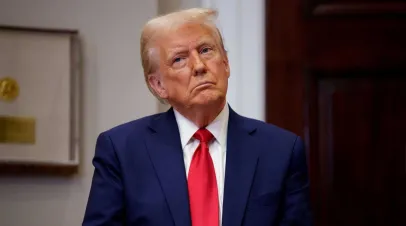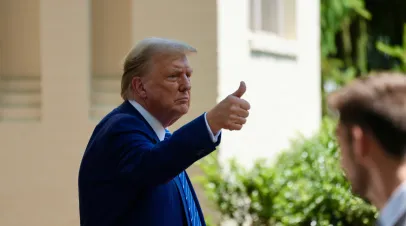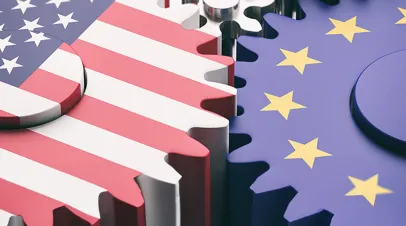Transatlantic Tariff Tracker
US President Donald Trump has announced an unprecedented number of trade actions in his early days. These actions will impact the competitiveness of the United States and its trading partners and will upend decades of economic integration. The US trade and investment relationship with the EU is the largest and most complex economic relationship in the world. Transatlantic trade flows (goods and services trade) averaged an estimated $6.1 billion per day in 2023. The total stock of transatlantic investment was $5.1 trillion in 2022.
GMF is tracking announcements that have the greatest impact on the transatlantic economic relationship.
Tariff Glossary
De minimis: A specific policy used by customs officials to exempt small value imports from formal customs paperwork and filing requirements.
EC: European Commission, the executive branch of the European Union (EU), and holds primary responsibility for European trade policy.
EU: European Union, a political and economic union comprised of 27 member states located in Europe.
IEEPA: The International Economic Emergency Act of 1977. This authorizes the president to regulate imports during a national emergency declared under the NEA. No consultation or investigation is required.
MFN: Most Favored Nation. A policy of the WTO requiring that all members apply the same tariff rates to all other members, intended to prevent a nation from placing higher tariffs on one country rather than another for an identical product.
NEA: National Emergencies Act of 1976. This established a framework for the president to declare a national emergency, granting access to specific additional powers.
Non-tariff barrier: a restriction on trade that does not require a tax, such as safety regulation or quotas.
Quota: Restriction on the number of goods that can be imported into a country.
Section 201: Section 201 of the Trade Act of 1974 allows the president to impose temporary duties and other trade measures if the US International Trade Commission (ITC) determines a surge in imports is a substantial cause or threat of serious injury to a US industry. This triggers an investigation.
Section 232: Section 232 of the Trade Act of 1962 allows the president to adjust imports if the Department of Commerce finds certain products are imported in such quantities or under such circumstances as to threaten to impair US national security. This triggers an investigation.
Section 301: Section 301 of the Trade Act of 1974 allows the US to respond to unfair foreign trade practices. The USTR can use this section to investigate and retaliate against foreign governments that restrict US commerce. It allows USTR to suspend trade agreements or impose import restrictions if a trading partner violates a trade agreement or engages in discriminatory or unreasonable practices that burden or restrict US commerce. This triggers an investigation.
Section 604: Section 604 of the Trade Act of 1974 grants the US president the authority to incorporate into the Harmonized Tariff Schedule of the United States (HTS) the substance of provisions from the Trade Act and other laws related to import treatment. This includes actions such as removing, modifying, continuing, or imposing duties or import restrictions.
Supply Chain: The raw materials, intermediate products, facilities, and transportation needed to manufacture and move a product from a supplier to a customer.
Tariffs: Tax on the import or export of goods between countries. The importer of record pays the import tariffs at the border.
USTR: United States Trade Representative, an agency of the US government responsible for developing and promoting US foreign trade policies.
USCBP: United States Customs and Border Protection, an agency of the Department of Homeland Security, responsible for enforcing immigration and customs laws.
VAT: Value-Added Tax. A consumption tax placed on a good or service at every state in the supply chain where value is added, with the final cost of the tax paid by the consumer. Most countries, including all of the EU, apply a VAT, while the US does not.
WTO: World Trade Organization. An international economic organization designed as a forum for negotiating trade agreements and settling disputes. WTO rules require all members to apply transparent and consistent tariff policies to all other members.
